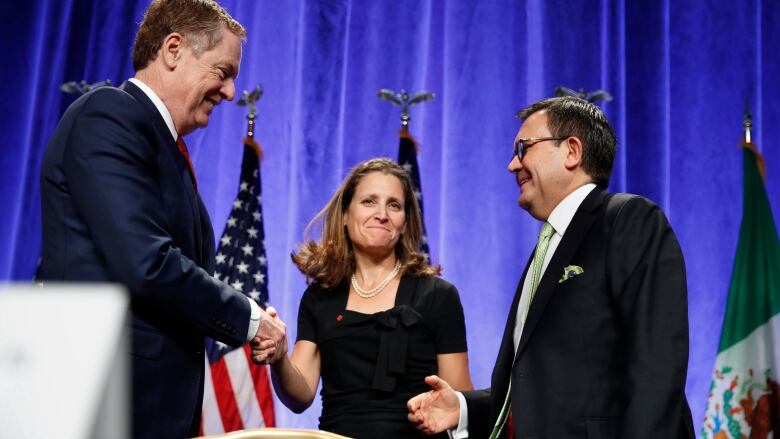Canada has no business lecturing Mexico and the U.S. over labour laws: Neil Macdonald
Maybe our virtue-signalling is just tactical something we'll drop once we get what we want. Let's hope so

So, I'm going to pretend for a moment that I'm a French trade negotiator, sitting at the table with Foreign Affairs Minister Chrystia Freeland and her team, demanding a renegotiation of CETA, the Canada-EU trade agreement now being held up by Ottawa as a triumph for Canada.
"Bonjour, Madame Freeland.
"As you may know, we in France have something called Le Code du Travail. It is a progressive, unique, historic document, something we are very proud of.
"Our Code du Travail is nearly 3300 pages long. One hundred and seventy pages are devoted to rules governing termination of employment. The section on health and security is more than 400 pages long. It is complex, and employers often have to consult experts in order to properly understand it.
"We of course have a 35-hour work week, and very strict regulations ensuring workers don't have to work too hard or too long. We are proud to say we have a high minimum wage, much higher than that which exists in your country. You are closer to the levels in the United States, which we consider a form of indentured labour.
"We also make it practically impossible to fire a worker. In fact, you might be interested to know that under our law, financial difficulty or declining revenue is not in itself justification for laying off employees. The employer must effectively obtain permission from the authorities, and that permission, believe me, is not granted lightly.
"Further, it is not uncommon in France for an employee's payroll taxes to exceed the employee's salary.
"I say all these things, Madame Freeland, because Canada does not have a labour code such as ours.
"This of course gives your companies an unfair advantage over our companies. Our companies are forced by law to behave responsibly and in a caring, compassionate fashion. Yours are not.
"So. We demand that as a matter of social justice, and basic human rights, that any trade treaty with Canada carries the obligation to create a system in Canada similar to ours. We will of course provide advisers to help you begin to fulfill your natural obligations to Canadian workers. That is our position. Merci, and let the renegotiations begin."

I have no idea whether the French made any such representation during the CETA negotiations, but I suspect that if they had, Freeland would have pulled one of her now-famous bolts, walking dramatically away from the table with her team in tow as cameras rolled, and then given interviews huffing about how Canada will not accept moral dictation about workers' rights.
Canada might even characterize such demands as "virtue-signalling."
The fact is, France has its deal with workers (which its government is once again trying to change, having been forced to back down in the past), and so does Canada, and they are different, and that's that.
France has no more business lecturing us than we have lecturing, say, the United States and Mexico.
And yet, we are.
Right to work laws
Canada wants the United States government to prohibit "right to work" laws that exist in about half the 50 states. It also wants Mexico and the U.S. to toughen up environmental regulations, and wants the deal to address Indigenous and gender rights.
Admittedly, "right to work" is a pretty dubious label. It basically means workers don't have to pay union dues, which of course cripples unions. And absent a collective agreement, a worker can be fired any time for any reason, or no reason at all. Barack Obama called it "the right to work for less."
In that sense, American companies do have an edge over Canadian companies, which have to abide by far morelaws meant to protect workers.
And the American workers'-rights vacuum can get pretty weird, at least by Canadian standards. My favourite example is the 2012 case of the dentist in Iowa, a right to work state, who fired his dental assistant because she was too attractive, and he was having fantasies about sex with her, and felt (along with his wife and pastor) that his horniness was endangering his marriage.
The dental assistant, whose professional behaviour had been impeccable, and whose only sin was not being ugly, sued and lost. Imagine that case going to court in Canada?
Mexico is another story. It is far more corrupt, and trade unions are often effectively owned and operated by the employer, which means collective agreements aren't agreements at all, but simply the employer's notion of how things should operate. Again, that's a competitive edge.
As for environmental standards, well, we have the tarsands sorry, the oilsands one of the biggest emitters of greenhouse gases on the planet. Gender rights? We sell weapons to Saudi Arabia, which crushes minorities and treats women like house pets. Indigenous rights? I have been to indigenous communities in the United States that are wealthy, and to Indigenous communities there that are dirt poor.
Just like Canada.
A negotiating tactic
Now, it may be that our virtue-signalling to the Americans and the Mexicans is just tactical: a feel-good political statement for the home audience that we'll drop the moment we get what we really want, such as serious and fair access to their softwood lumber markets.
Maybe we just want to distract them from the fact that while they allow any shipment worth less than $800 to sail through American customs unimpeded and untaxed, exposing their retailers to foreign competition, we effectively maintain a high wall of taxes and regulations to shield Canadian retailers. And banks. And our dairy and poultry industry.
Maybe. Let's hope so.
Because we need an intact trade deal. Millions of jobs depend on it, and Prime Minister Justin Trudeau has admitted he doesn't have any Plan B if Donald Trump cancels NAFTA.
The fact is, labour laws and the other issues Canada is raising are part of social compacts that vary from one democracy to another. They have their systems, we have ours.
We have to do business. Let's get on with this.
This column is part ofCBC'sOpinion section.For more information about this section, please read thiseditor'sblogandourFAQ.













_(720p).jpg)


 OFFICIAL HD MUSIC VIDEO.jpg)
.jpg)



























































































